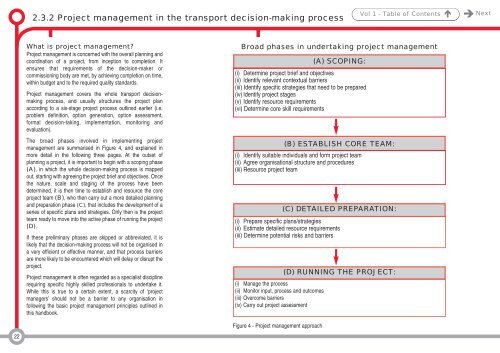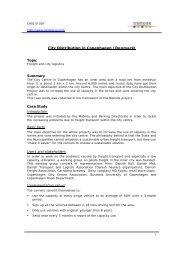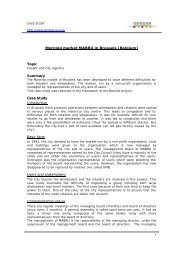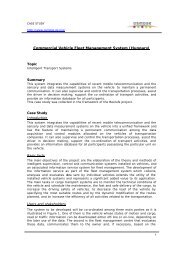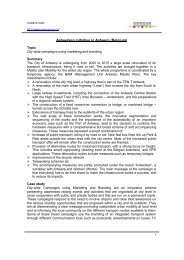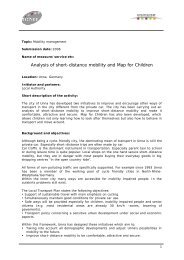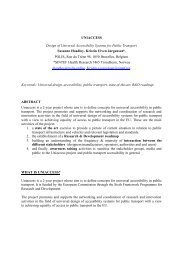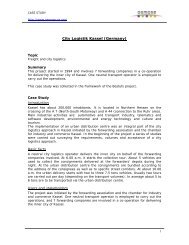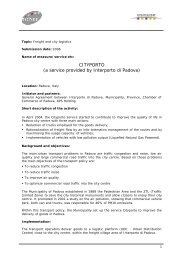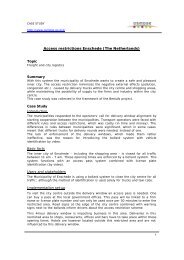Successful transport decision-making - Osmose
Successful transport decision-making - Osmose
Successful transport decision-making - Osmose
You also want an ePaper? Increase the reach of your titles
YUMPU automatically turns print PDFs into web optimized ePapers that Google loves.
2.3.2 Project management in the <strong>transport</strong> <strong>decision</strong>-<strong>making</strong> process<br />
Vol 1 - Table of Contents <br />
Next<br />
What is project management?<br />
Project management is concerned with the overall planning and<br />
coordination of a project, from inception to completion. It<br />
ensures that requirements of the <strong>decision</strong>-maker or<br />
commissioning body are met, by achieving completion on time,<br />
within budget and to the required quality standards.<br />
Project management covers the whole <strong>transport</strong> <strong>decision</strong><strong>making</strong><br />
process, and usually structures the project plan<br />
according to a six-stage project process outlined earlier (i.e.<br />
problem definition, option generation, option assessment,<br />
formal <strong>decision</strong>-taking, implementation, monitoring and<br />
evaluation).<br />
The broad phases involved in implementing project<br />
management are summarised in Figure 4, and explained in<br />
more detail in the following three pages. At the outset of<br />
planning a project, it is important to begin with a scoping phase<br />
(A), in which the whole <strong>decision</strong>-<strong>making</strong> process is mapped<br />
out, starting with agreeing the project brief and objectives. Once<br />
the nature, scale and staging of the process have been<br />
determined, it is then time to establish and resource the core<br />
project team (B), who then carry out a more detailed planning<br />
and preparation phase (C), that includes the development of a<br />
series of specific plans and strategies. Only then is the project<br />
team ready to move into the active phase of running the project<br />
(D).<br />
If these preliminary phases are skipped or abbreviated, it is<br />
likely that the <strong>decision</strong>-<strong>making</strong> process will not be organised in<br />
a very efficient or effective manner, and that process barriers<br />
are more likely to be encountered which will delay or disrupt the<br />
project.<br />
Project management is often regarded as a specialist discipline<br />
requiring specific highly skilled professionals to undertake it.<br />
While this is true to a certain extent, a scarcity of ‘project<br />
managers’ should not be a barrier to any organisation in<br />
following the basic project management principles outlined in<br />
this handbook.<br />
Broad phases in undertaking project management<br />
(A) SCOPING:<br />
(i) Determine project brief and objectives<br />
(ii) Identify relevant contextual barriers<br />
(iii) Identify specific strategies that need to be prepared<br />
(iv) Identify project stages<br />
(v) Identify resource requirements<br />
(vi) Determine core skill requirements<br />
(B) ESTABLISH CORE TEAM:<br />
(i) Identify suitable individuals and form project team<br />
(ii) Agree organisational structure and procedures<br />
(iii) Resource project team<br />
(C) DETAILED PREPARATION:<br />
(i) Prepare specific plans/strategies<br />
(ii) Estimate detailed resource requirements<br />
(iii) Determine potential risks and barriers<br />
(i) Manage the process<br />
(ii) Monitor input, process and outcomes<br />
(iii) Overcome barriers<br />
(iv) Carry out project assessment<br />
(D) RUNNING THE PROJECT:<br />
22<br />
Figure 4 - Project management approach


